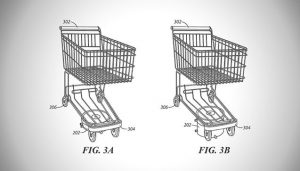Wal*mart Courageously Pursues Self-Driving Shopping Carts

When you arrive at your local Wal*Mart and have to select a shopping cart you typically have two choices: a push cart or a motorized cart. But what is there for someone who would prefer something in between the two? A self-driving shopping cart! Maybe you’re not ready to become someone who rides around Wal*Mart on a motorized cart, but you are still too lazy to push a cart by yourself. Don’t worry, Wal*Mart’s got you.

The retailer recently filed a patent on a self-driving cart model. Patrons would be able to hail the self-driving cart from anywhere in the store, at any time. Afterwards, instead of having employees collect carts from the parking lot, the self-driving carts would navigate back to the store by themselves. The proposed model – which is equipped with a motor and camera – would also be able to search the store independently for
the items the shopper is looking for.
Images of Wal*Mart’s self-driving shopping cart model, from CNN Money, depict a conventional push cart with a removal motor attached behind the front wheels [1]:

The cart has the potential to minimize the cost of labor, since the carts (not Wal*Mart employees) would be able to organize themselves and could even help customers find the items they’re looking for. It’s easy to see why Wal*Mart is pursuing the idea, since it could have a positive effect on customer service. The project is also innovative and, if a little silly, still interesting science.
The buzz surrounding self-driving cars, particularly Tesla Autopilot and Uber self-driving prototypes,

has no-doubt given Wal*Mart the confidence to pursue a project like self-driving carts. Google and others working on self-driving car projects maintain that, despite the public’s skepticism, machines are better and safer drivers than most humans, particularly in crowded cities [2].
That’s not to say it’s easy to teach cars to drive, particularly when it comes to the ambiguities involved in “deciding” what to do in an emergency situation. See “The Ethics of Automation: When Self-Driving Cars Decide Who Lives and Who Dies” for more on the ethical issues behind automating something as dangerous as a car.
When it comes to self-driving carts, the stakes are much, much lower.While there are fewer ethical issues involved in adopting self-driving shopping carts (perhaps just the technology’s immediate effect on workers), there is also less to gain. As of now, shopping carts honestly don’t do much for customers. The average shopper is not inconvenienced by pushing a cart around as he or she browses and very few shoppers forget to get a cart when they enter a Wal*Mart.
Carts are, however, the most direct interaction point between a store like Wal*Mart and its customers. If the company succeeds in building the model it has proposed, future models could include more interactive features that make the shopping experience more efficient for shoppers and more lucrative for the retail chain. Self-driving shopping carts, even the current proposed model, could also help clear parking lots of shopping cart congestion and relieve workers of the dreaded cart duty.




